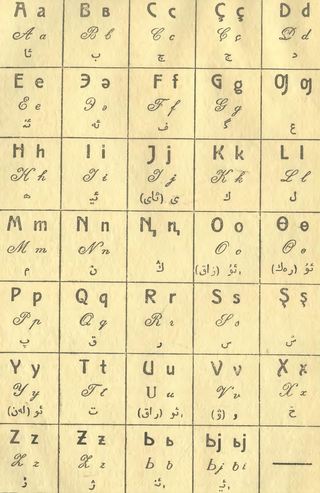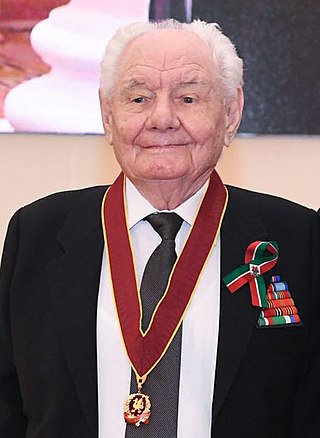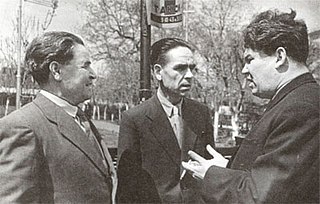
The Tatars is an umbrella term for different Turkic ethnic groups bearing the name "Tatar". Initially, the ethnonym Tatar possibly referred to the Tatar confederation. That confederation was eventually incorporated into the Mongol Empire when Genghis Khan unified the various steppe tribes. Historically, the term Tatars was applied to anyone originating from the vast Northern and Central Asian landmass then known as Tartary, a term which was also conflated with the Mongol Empire itself. More recently, however, the term has come to refer more narrowly to related ethnic groups who refer to themselves as Tatars or who speak languages that are commonly referred to as Tatar.

Tatar is a Turkic language spoken by the Volga Tatars mainly located in modern Tatarstan, as well as Siberia. It should not be confused with Crimean Tatar or Siberian Tatar, which are closely related but belong to different subgroups of the Kipchak languages.
Three scripts are currently used for the Tatar language: Arabic, Cyrillic and Latin.
The Old Tatar was a literary language used by some ethnic groups of the Volga-Ural region from the Middle Ages until the 19th century.

Jaꞑalif, Yangalif or Yañalif is the first Latin alphabet used during the latinisation in the Soviet Union in the 1930s for the Turkic languages. It replaced the Yaña imlâ Arabic script-based alphabet in 1928, and was replaced by the Cyrillic alphabet in 1938–1940. After their respective independence in 1991, several former Soviet states in Central Asia switched back to Latin script, with slight modifications to the original Jaꞑalif.

The territory of Tatarstan, a republic of the Russian Federation, was inhabited by different groups during the prehistoric period. The state of Volga Bulgaria grew during the Middle Ages and for a time was subject to the Khazars. The Volga Bulgars became Muslim and incorporated various Turkic peoples to form the modern Volga Tatar ethnic group.

The Volga Tatars or simply Tatars are a Turkic ethnic group native to the Volga-Ural region of Russia. They are subdivided into various subgroups. Volga Tatars are the second-largest ethnic group in Russia after ethnic Russians. Most of them live in the republics of Tatarstan and Bashkortostan. Their native language is Tatar, a language of the Kipchak-Bolgar subdivision of the Turkic language family. Majority religion is Sunni Islam.
Tatar Encyclopaedic Dictionary is the first encyclopaedic dictionary published in Tatar language about history of Tatarstan and the Tatar people. The publication is produced by Tatar Encyclopedia Institute of the Republic of Tatarstan Academy of Sciences.

The All-Tatar Public Center (ATPC) was a Tatar nationalist organization founded on 7 July 1988 to promote Tatarstan sovereignty and self-determination. The ATPC headquarters were in Kazan, Tatarstan. On 10 June 2022 the organization was labeled an extremist organization and dissolved by the government of Tatarstan.
The Communist Party of the Republic of Tatarstan was a communist political party that existed from 1991 to 1997 in Tatarstan, nowadays a federal subject of Russia, but at that time it was a self-proclaimed republic.
Ittifaq or Ittifak may refer to:
- Ittifaq al-Muslimin, a political party of Muslims in the Russian Empire
- Ittifaq Party, a nationalist political party in Tatarstan
- İttifaQ, the Tatar hip-hop group

Mirfatyh Zakievich Zakiev was a Soviet and Russian controversial academic in the domain of Turkology scholar.
Mishar Tatar or Misher Tatar, also Western Tatar, is a dialect of Tatar spoken by Mishar Tatars mainly located at Penza, Ulyanovsk, Orenburg, Nizhny Novgorod, Samara, Volgograd, Saratov oblasts of Russia and in Tatarstan, Bashkortostan, Chuvashia and Mordovia of Russian Federation and Finland.

Ildar Irekovich Gilmutdinov is a deputy for the United Russia party in the 7th State Duma of the Russian Federation. He is the head of the committee for nationalities. Chairman of the Council of the Federal National and Cultural Autonomy of the Tatars. Gilmutdinov received international sanctions in 2022 for his support of the Russian invasion of Ukraine.
Tatarophobia refers to the fear of, the hatred towards, demonization of, or prejudice against people who are generally referred to as Tatars, including but not limited to Volga, Siberian, and Crimean Tatars, although negative attitudes against the latter are by far the most severe, largely as a result of the Soviet media's long-standing practice of only depicting them in a negative way along with its practice of promoting negative stereotypes in order to provide a political justification for their deportation and marginalization.

Fauziya Aukhadiyevna Bayramova is a Tatar politician and writer. She was a founder of the Tatarstan independence party The Ittifaq Party. From 1990 to 1995 she was a member of the State Council of the Republic of Tatarstan. From 1994 to 1997 she was the chair of the Milli Majlis, the unrecognized Tatar parliament, which she helped to establish. She was also a contributor to the constitution of Tatarstan. She has written a number of political manifestos and histories, focusing on topics relating to the Tatar people and their political circumstances, and has worked as a journalist and publisher.
Milli İdärä was the national government of Muslim Turko-Tatars of Inner Russia and Siberia that was elected by the delegates of Millät Mäclese and located in Ufa (Öfä) from January 11, 1918, to April 21, 1918. Its Chairman was Sadri Mäqsudi, with İbneämin Äxtämef being deputy chairman.

Äxmät İsxaq was a Soviet-Tatar poet, translator, and journalist.
Tatar Maqılı is a rural locality in Yuğarı Oslan District, Tatarstan. The population was 166 as of 2010.
Tatar Ayshase is a rural locality in Vysokogorsky District, Tatarstan. The population was 161 as of 2010.











